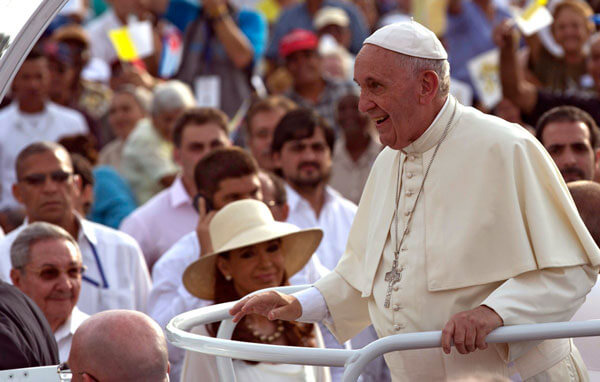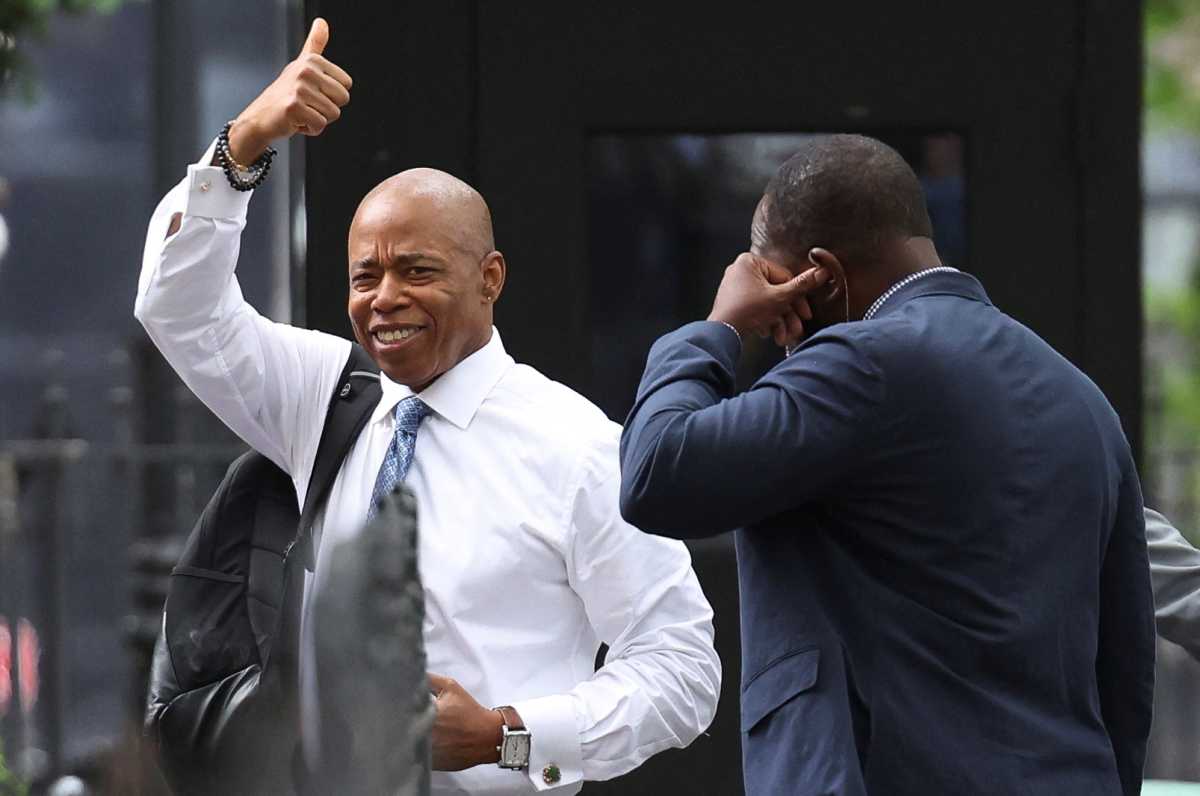Amid tears and cheers, Pope Francis, the architect of the United States-Cuba rapprochement, began his historic trip to Cuba on Saturday with a message of solidarity and reconciliation, according to reports here.
After his flight from Rome, Pope Francis touched down at José Martí International Airport in Havana, greeting the Cuban people by noting that this year marks the 80th anniversary of uninterrupted diplomatic relations between Cuba and the Holy See, according to the Miami Herald.
“Today, we renew these cooperative ties and friendship so that the church can continue to support and encourage the Cuban people in their hopes and concerns with the freedom, means and spaces necessary to carry the proclamation of the kingdom to the existential peripheries of society,” he said in remarks on the tarmac.
“For several months, we have witnessed an event that fills us with hope: the process of normalizing relations between two nations after years of estrangement,” he added.
The Pope’s nine-day visit that also includes the United States comes as the former Cold War foes continue to normalize relations.
The pope played a crucial role in thawing the relationship when he personally appealed to U.S. President Barack Obama and Cuban leader Raúl Castro last year and hosted a meeting at the Vatican as the countries worked in secret to end more than a half-century of animosity, the Herald said.
After a welcome ceremony that featured a military salute and a brass band playing the Cuban national anthem, Castro gave his welcome before Pope Francis spoke.
In a 15-minute speech, Castro repeated calls for the U.S. to end its embargo of the Spanish-speaking Caribbean island, describing the embargo as “cruel, immoral and illegal,” according to the Herald.
The Cuban leader also called for the return of the U.S. Navy base at Guantánamo Bay.
He thanked the pontiff for mediating discussions between Cuba and the US, stating that he will be in New York next week when the Pope addressing the 70th Session of the United Nations General Assembly.
While in Cuba, Pope Francis will visit three cities: Havana, Holguín and Santiago, the Herald said.
In El Cobre, an old copper mining town outside Santiago, the Pope will deliver the homily during a Mass celebrated at the shrine dedicated to Our Lady of Charity, the patroness of Cuba.
But as he arrived in Havana, the Pontiff faces a new challenge altogether: Having helped open up Cuba to the world, the first Latin American pope must now try to fully open up Cuba to the Roman Catholic Church, the New York Times said.
“It is an occasion to ask for more openness,” said the Rev. Jorge Cela, who oversaw the Jesuit religious order in Cuba from 2010 to 2012. “The relationship is not easy.”
For decades, the Cuban church has been wary of inciting the wrath of a Communist government that all but marginalized it after the 1959 revolution, when priests were cast out, religious schools were closed and the state was declared atheist, the Times said.
It said some call this caution wise pragmatism, noting that the Cuban government has gradually loosened its grip.
But critics, according to the Times, contend that the Cuban church has been too timid — eager to maintain close ties with the government, at the expense of speaking out for greater political and religious freedom in Cuban society.
“We could do more,” said the Rev. José Conrado, an outspoken Cuban priest based in the central city of Trinidad, speaking by telephone. “The church should not back off, even if doing so is difficult and problematic for the church itself.”
Francis has a global reputation for blunt talk and big symbolic gestures, so his trip to Cuba will be closely watched, the Times said.
Few analysts think he will press too hard in public, but diplomats in Rome do expect him to talk about religious freedom, as Pope John Paul II and Pope Benedict XVI did during past Cuba visits, the paper noted.
It said Francis is expected to push for more space for the church to operate in Cuban life — currently there are fewer than 350 priests on an island of just over 11 million people, and the church is forbidden from running schools or hospitals.
With the pope’s four-day stay in Cuba, Amnesty International, the London-based human rights watchdog, said the island is at a human rights crossroads.
Amnesty International noted that there have been “important advances”, such as the recent release of prisoners of conscience and other activists and a number of positive reforms to its migration laws “overshadowed by the government’s determination to deploy new methods to stifle dissent.”
“Over the past few months, we have seen unprecedented openness when it comes to Cuba’s international relations. However, the country still needs to make progress when it comes to allowing people to peacefully express their views without fear of being harassed, detained or attacked,” said Erika Guevara-Rosas, Americas Director at Amnesty International.
She said that, over the past few years, authorities in Cuba have switched from a strategy of incarcerating people viewed as political dissidents for long periods of time to consecutive short term arrests and public smear campaigns.
According to the Cuban Commission for Human Rights and National Reconciliation (Comisión Cubana de Derechos Humanos y Reconciliación Nacional), there were 768 “politically” motivated detentions in August 2015 alone – up from 674 in July 2015.
“If the Cuban authorities are serious about instigating real changes, they must show openness not only with other governments but also with independent human rights monitoring bodies, such as Amnesty International and UN Special Procedures on human rights, who have been banned from the country for years,” said Erika Guevara-Rosas.

























